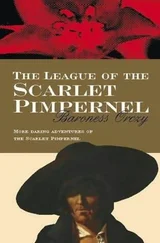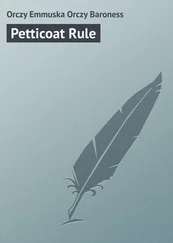Emmuska Orczy - Lord Tony's Wife - An Adventure of the Scarlet Pimpernel
Здесь есть возможность читать онлайн «Emmuska Orczy - Lord Tony's Wife - An Adventure of the Scarlet Pimpernel» — ознакомительный отрывок электронной книги совершенно бесплатно, а после прочтения отрывка купить полную версию. В некоторых случаях можно слушать аудио, скачать через торрент в формате fb2 и присутствует краткое содержание. Издательство: Иностранный паблик, Жанр: foreign_language, foreign_prose, на английском языке. Описание произведения, (предисловие) а так же отзывы посетителей доступны на портале библиотеки ЛибКат.
- Название:Lord Tony's Wife: An Adventure of the Scarlet Pimpernel
- Автор:
- Издательство:Иностранный паблик
- Жанр:
- Год:неизвестен
- ISBN:нет данных
- Рейтинг книги:4 / 5. Голосов: 1
-
Избранное:Добавить в избранное
- Отзывы:
-
Ваша оценка:
- 80
- 1
- 2
- 3
- 4
- 5
Lord Tony's Wife: An Adventure of the Scarlet Pimpernel: краткое содержание, описание и аннотация
Предлагаем к чтению аннотацию, описание, краткое содержание или предисловие (зависит от того, что написал сам автор книги «Lord Tony's Wife: An Adventure of the Scarlet Pimpernel»). Если вы не нашли необходимую информацию о книге — напишите в комментариях, мы постараемся отыскать её.
Lord Tony's Wife: An Adventure of the Scarlet Pimpernel — читать онлайн ознакомительный отрывок
Ниже представлен текст книги, разбитый по страницам. Система сохранения места последней прочитанной страницы, позволяет с удобством читать онлайн бесплатно книгу «Lord Tony's Wife: An Adventure of the Scarlet Pimpernel», без необходимости каждый раз заново искать на чём Вы остановились. Поставьте закладку, и сможете в любой момент перейти на страницу, на которой закончили чтение.
Интервал:
Закладка:
Pierre Adet had disappeared. But M. le duc's vengeance had need of a prey. The outrage which he was quite convinced had been perpetrated against his daughter must be punished by death – if not by the death of the chief offender, then by that of the one who stood nearest to him. Thus was Jean Adet the miller dragged from his home and cast into prison. Was he not implicated himself in the riots? Camille the bailiff had seen and heard him among the insurgents on the hillock that night. At first it was stated that he would be held as hostage for the reappearance of his son. But Pierre Adet had evidently fled the countryside: he was obviously ignorant of the terrible fate which his own folly had brought upon his father. Many thought that he had gone to seek his fortune in Paris where his talents and erudition would ensure him a good place in the present mad rush for equality amongst all men. Certain it is that he did not return and that with merciless hate and vengeful relentlessness M. le duc de Kernogan had Jean Adet hanged for a supposed crime said to be committed by his son.
Jean Adet died protesting his innocence. But the outburst of indignation and revolt aroused by this crying injustice was swamped by the torrent of the revolution which, gathering force by these very acts of tyranny and of injustice, soon swept innocent and guilty alike into a vast whirlpool of blood and shame and tears.
BOOK ONE: BATH, 1793
CHAPTER I
THE MOOR
Silence. Loneliness. Desolation.
And the darkness of late afternoon in November, when the fog from the Bristol Channel has laid its pall upon moor and valley and hill: the last grey glimmer of a wintry sunset has faded in the west: earth and sky are wrapped in the gloomy veils of oncoming night. Some little way ahead a tiny light flickers feebly.
"Surely we cannot be far now."
"A little more patience, Mounzeer. Twenty minutes and we be there."
"Twenty minutes, mordieu. And I have ridden since the morning. And you tell me it was not far."
"Not far, Mounzeer. But we be not 'orzemen either of us. We doan't travel very fast."
"How can I ride fast on this heavy beast? And in this satané mud. My horse is up to his knees in it. And I am wet – ah! wet to my skin in this sacré fog of yours."
The other made no reply. Indeed he seemed little inclined for conversation: his whole attention appeared to be riveted on the business of keeping in his saddle, and holding his horse's head turned in the direction in which he wished it to go: he was riding a yard or two ahead of his companion, and it did not need any assurance on his part that he was no horseman: he sat very loosely in his saddle, his broad shoulders bent, his head thrust forward, his knees turned out, his hands clinging alternately to the reins and to the pommel with that ludicrous inconsequent gesture peculiar to those who are wholly unaccustomed to horse exercise.
His attitude, in fact, as well as the promiscuous set of clothes which he wore – a labourer's smock, a battered high hat, threadbare corduroys and fisherman's boots – at once suggested the loafer, the do-nothing who hangs round the yards of half-way houses and posting inns on the chance of earning a few coppers by an easy job which does not entail too much exertion on his part and which will not take him too far from his favourite haunts. When he spoke – which was not often – the soft burr in the pronunciation of the sibilants betrayed the Westcountryman.
His companion, on the other hand, was obviously a stranger: high of stature, and broadly built, his wide shoulders and large hands and feet, his square head set upon a short thick neck, all bespoke the physique of a labouring man, whilst his town-made clothes – his heavy caped coat, admirably tailored, his buckskin breeches and boots of fine leather – suggested, if not absolutely the gentleman, at any rate one belonging to the well-to-do classes. Though obviously not quite so inexperienced in the saddle as the other man appeared to be, he did not look very much at home in the saddle either: he held himself very rigid and upright and squared his shoulders with a visible effort at seeming at ease, like a townsman out for a constitutional on the fashionable promenade of his own city, or a cavalry subaltern but lately emerged from a riding school. He spoke English quite fluently, even colloquially at times, but with a marked Gallic accent.
The road along which the two cavaliers were riding was unspeakably lonely and desolate – an offshoot from the main Bath to Weston road. It had been quite a good secondary road once. The accounts of the county administration under date 1725 go to prove that it was completed in that year at considerable expense and with stone brought over for the purpose all the way from Draycott quarries, and for twenty years after that a coach used to ply along it between Chelwood and Redhill as well as two or three carriers, and of course there was all the traffic in connexion with the Stanton markets and the Norton Fairs. But that was nigh on fifty years ago now, and somehow – once the mail-coach was discontinued – it had never seemed worth while to keep the road in decent repair. It had gone from bad to worse since then, and travelling on it these days either ahorse or afoot had become very unpleasant. It was full of ruts and crevasses and knee-deep in mud, as the stranger had very appositely remarked, and the stone parapet which bordered it on either side, and which had once given it such an air of solidity and of value, was broken down in very many places and threatened soon to disappear altogether.
The country round was as lonely and desolate as the road. And that sense of desolation seemed to pervade the very atmosphere right through the darkness which had descended on upland and valley and hill. Though nothing now could be seen through the gloom and the mist, the senses were conscious that even in broad daylight there would be nothing to see. Loneliness dwelt in the air as well as upon the moor. There were no homesteads for miles around, no cattle grazing, no pastures, no hedges, nothing – just arid wasteland with here and there a group of stunted trees or an isolated yew, and tracts of rough, coarse grass not nearly good enough for cattle to eat.
There are vast stretches of upland equally desolate in many parts of Europe – notably in Northern Spain – but in England, where they are rare, they seem to gain an additional air of loneliness through the very life which pulsates in their vicinity. This bit of Somersetshire was one of them in this year of grace 1793. Despite the proximity of Bath and its fashionable life, its gaieties and vitality, distant only a little over twenty miles, and of Bristol distant less than thirty, it had remained wild and forlorn, almost savage in its grim isolation, primitive in the grandeur of its solitude.
The road at the point now reached by the travellers begins to slope in a gentle gradient down to the level of the Chew, a couple of miles further on: it was midway down this slope that the only sign of living humanity could be perceived in that tiny light which glimmered persistently. The air itself under its mantle of fog had become very still, only the water of some tiny moorland stream murmured feebly in its stony bed ere it lost its entity in the bosom of the river far away.
"Five more minutes and we be at th' Bottom Inn," quoth the man who was ahead in response to another impatient ejaculation from his companion.
"If we don't break our necks meanwhile in this confounded darkness," retorted the other, for his horse had just stumbled and the inexperienced rider had been very nearly pitched over into the mud.
"I be as anxious to arrive as you are, Mounzeer," observed the countryman laconically.
Читать дальшеИнтервал:
Закладка:
Похожие книги на «Lord Tony's Wife: An Adventure of the Scarlet Pimpernel»
Представляем Вашему вниманию похожие книги на «Lord Tony's Wife: An Adventure of the Scarlet Pimpernel» списком для выбора. Мы отобрали схожую по названию и смыслу литературу в надежде предоставить читателям больше вариантов отыскать новые, интересные, ещё непрочитанные произведения.
Обсуждение, отзывы о книге «Lord Tony's Wife: An Adventure of the Scarlet Pimpernel» и просто собственные мнения читателей. Оставьте ваши комментарии, напишите, что Вы думаете о произведении, его смысле или главных героях. Укажите что конкретно понравилось, а что нет, и почему Вы так считаете.












